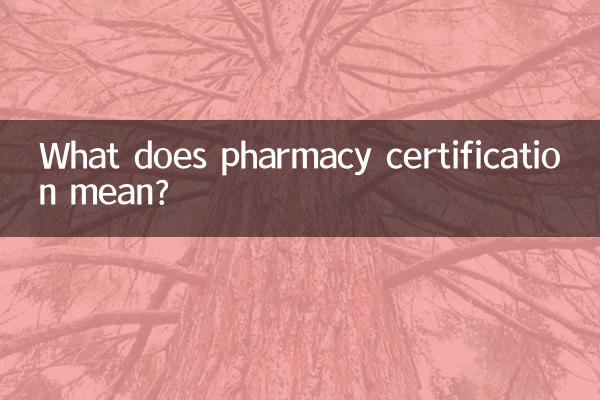What does pharmacy certification mean?
In today's society, pharmacies are an important part of medical and health services, and their legality and professionalism have attracted much attention. Pharmacy certification refers to the review of pharmacy qualifications, operating conditions, drug quality and other aspects through relevant agencies to ensure that they comply with national or regional laws and regulations. This article will provide a detailed explanation around the definition, process, importance and recent hot topics of pharmacy certification.
1. Definition of pharmacy certification

Pharmacy certification refers to the process by which pharmacies pass the review of government or industry agencies and obtain legal business qualifications. Certification content includes but is not limited to: pharmaceutical business license, GSP (Good Manufacturing Practice) certification, pharmacist qualification review, etc. Certified pharmacies can legally sell medicines within the legal framework and provide consumers with safe and reliable pharmaceutical services.
2. Pharmacy certification process
Pharmacy certification usually involves the following steps:
| steps | content |
|---|---|
| 1. Submit application | Pharmacies submit certification applications and related materials to the local drug regulatory department. |
| 2. Material review | The department conducts a preliminary review of the pharmacy's qualifications, staffing, business premises, etc. |
| 3. On-site inspection | Auditors conduct on-site inspections of pharmacies to check whether drug storage, quality management, etc. meet standards. |
| 4. Issue certificate | After passing the review, the pharmacy obtains a certification certificate and can operate legally. |
3. The Importance of Pharmacy Certification
Pharmacy certification is not only a legal requirement, but also an important measure to protect consumer health. The following are the main meanings of certification:
1.Ensure drug quality: Certified pharmacies must abide by strict drug quality management regulations to ensure that the sources of drugs are legal and storage conditions meet standards.
2.Improve consumer trust: The certification mark reflects the professionalism and legitimacy of a pharmacy, and consumers are more inclined to choose certified pharmacies.
3.Standardize industry order: The certification system will help eliminate non-compliant pharmacies and promote the healthy development of the pharmaceutical industry.
4. Recent hot topics and hot content
In the past 10 days, discussions on pharmacy certification have mainly focused on the following aspects:
| topic | heat index | Main content |
|---|---|---|
| New regulations for GSP certification of pharmacies | high | Many places have introduced new regulations for GSP certification, requiring pharmacies to strengthen cold chain drug management. |
| Online pharmacy certification controversy | in | Some online pharmacies were exposed to have fake certifications, raising concerns about the safety of online drugs. |
| Pharmacy pharmacist qualification review | high | In many places, on-the-job inspections of pharmacists have been strengthened to crack down on "certification" behavior. |
5. How to check whether a pharmacy is certified
Consumers can verify a pharmacy’s certification status in the following ways:
1.View in-store announcements: Legal pharmacies need to hang the "Drug Business License" and GSP certification certificate in a conspicuous place.
2.Log in to the official website to inquire: Enter the pharmacy name or license number on the official website of the national or local drug administration to query.
3.Scan the QR code: Certification certificates in some regions are accompanied by a QR code. Scan the code to view detailed information.
6. Summary
Pharmacy certification is an important system to protect drug safety and consumer rights. As the pharmaceutical industry continues to develop, certification standards are gradually improving. When consumers choose pharmacies, they should give priority to certified formal institutions to ensure the safety of medication. At the same time, pharmacy operators must also strictly abide by certification requirements to provide better services to the public.

check the details

check the details